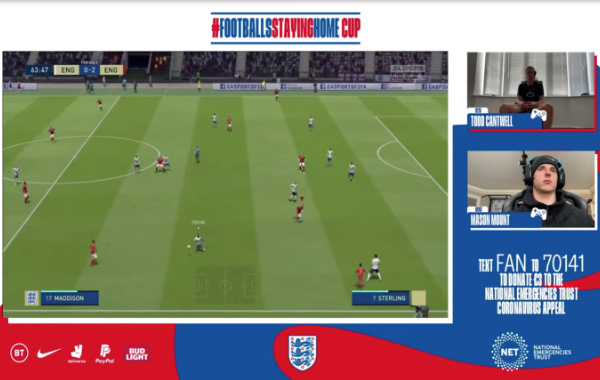Well, Covid 19 has managed to do the unthinkable
All sports and events are cancelled; all bars and restaurants are boarded up; and (mostly) we are stuck at home, in the sunniest April in living memory. So, we are turning to other entertainment – streams and streams of the stuff.
The lockdown is also one of the reasons why Disney+ in the UK has hit 50% of its five-year launch target in its first few months. And it has introduced millions of us to the joys of Zoom and Houseparty (and the very real risk of mixing up the unmute and hang-up buttons). Meanwhile Netflix added nearly 16 million new subscribers in the first quarter — double its forecast.
The huge demand has meant that most streaming services have had to throttle the quality of their bandwidth to cope with the demand. Under normal circumstances, there would have been an outcry – but the reaction has actually been a quiet muttering of “please don’t go off air… please don’t go off air”.
Do you even game, bro?
It is not just streaming that is booming, games are likewise thriving. Some of this is due to “leveling-up” – light players becoming medium players, and medium users becoming heavy users, and existing heavy users not pausing to eat …
One brand that is loving this is Twitch, with viewing up on average about 30% (over 60% in some European countries in lockdown). For those that are blissfully unaware, Twitch.tv is the streaming platform of choice for videogamers and esports. A not-so-quiet giant of a channel for posting, streaming and sharing videogame content where all things gaming are shown to passionate, lean-in audiences. If you love videogames, check it out, but you may have to allow yourself some time (admittedly, that’s one resource we have got at the moment) – it’s a rabbit warren, an amazing maze of gameplay. (Warning: If you do not love watching others play videogames, it might not be for you).
However, at least anecdotally and from social media coverage, it would appear that it is not just current users engaging more. Lapsed users are returning to the fold, often revisiting the games they previously enjoyed, and non-gamers are now getting into games, even if they don’t think of themselves as gamers (an age-old misconception). My friend’s 85-year-old mother-in-law has become an avid Words with Friends player, regularly having at least 2 games on the go, with her daughters and her grandchildren.
As we move forward, the gaming industry needs to think about how it can maintain at least some of the uplift and that probably means embracing alternative strategies.
Getting emotional
One way that brands may want to consider is tapping into the emotional benefits they provide (not just relying on more clips). Games are emotional. They are designed to drive deep and meaningful reactions – hair-raising excitement, pant-pooping fear, wonderous joy, competitive spirits or roll-on-the -floor laughter. They bring out the best (and worst) in us. Because they hit us right in the “feels”.
The virtually unstoppable rise of eSports
Another gaming sub-sector which was already in rapid expansion is eSports, where the market has moved from “why do people want to watch other people playing a video game?” to huge global tournaments and massive corporate sponsorship deals. Major mainstream sports sponsors like Coca-Cola, Red-Bull, McDonalds and (ermmm) Mercedes-Benz are now all ‘players’.
The appeal of eSports is massive and that includes amongst the more traditional sportspeople – just look at the number and quality of the stars that the FA have lined-up for their Coronavirus tournament – the aptly-named ‘Football’s Staying Home Cup‘.
On your bike! Now cycling is joining the action – from 29th April, the BBC is showing the Digital Swiss 5 – the latest virtual cycling race – with 19 teams taking part in a mini-Tour de Suisse, keeping fans, and sponsors, virtually engaged.
Is it time to think if (or how) your brands should be seeking a piece of the action?
Doing nothing shouldn’t be an option
In a world where speculating on “the new normal” is the new normal, Mark Ritson is resisting this siren call and – citing the outbreak of Mad Cow Disease in 1996 which was predicted to be the end of the British love of Roast Beef – says he doesn’t think that human nature will change fundamentally. “It’s not going to change – the world will quickly go back to normal” adding that “People have been building their cognitive systems for millions of years; they’re not going to change because they can’t go outside for a few months.”
I’m not sure I completely agree with him, other human crises have led to some pretty fundamental changes: many of us would now be surprised, and probably a little anxious if an airport didn’t send us through tight security measures when flying off on summer holiday, an expectation that fundamentally changed as a result of terrorism in the 90s and 00s.
I think brands in and around the streaming and gaming arenas should be thinking about strategies for engaging and retaining users – beyond just a free month on a subscription or some extra lives (the current brands go-to digital discounts). I mean deep, emotional, engaging strategies that speak to our passions, and to the long term.
Let’s get brands (and their ambassadors) involved. Virtual pro-celebrity Nascar and F1 races are already under starters orders. If they do nothing, or nothing new, brands may regret seeing things falling back quite quickly and this period will be a highly-engaged, but quickly-forgotten, one that was defined by…
“Staying home | Protecting the NHS | Playing more games.”
with credit to The Marketing Society


